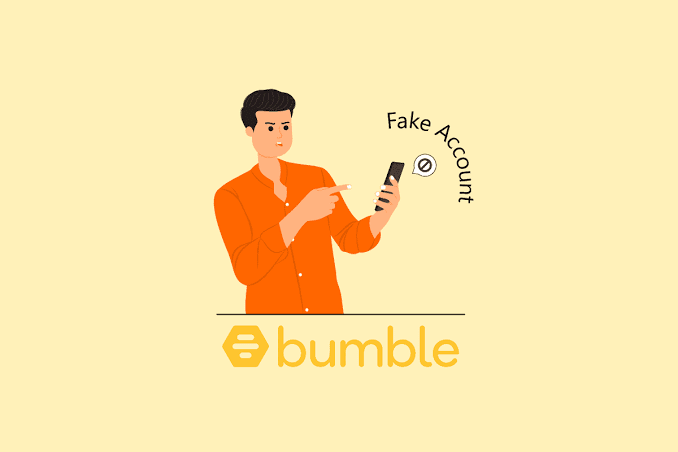In the ever-growing digital dating world, Bumble stands out for empowering women to make the first move and promoting respectful interactions. But even this female-first app isn’t immune to fake profiles. Whether it’s a catfish pretending to be someone they’re not or a bot trying to scam you out of money, fake Bumble profiles are a real threat. And while Bumble has implemented strong security features like Deception Detector and photo verification, scammers always find a loophole.
This article dives deep into the signs, behaviors, and red flags that come with fake profiles on Bumble—and how to protect yourself from becoming the next victim.

1. Why Perfection Is a Red Flag?
It starts with a jaw-dropping profile—flawless photos, vague but charming bio, and interests that align a little too well with yours. Sound familiar?
Scammers often use stolen pictures of celebrities, models, or influencers to create idealized personas. These “perfect” profiles are designed to instantly grab attention and lower your guard. They may claim to be wildly successful, travel constantly, or have exotic careers. But perfection rarely exists in the real world—and it definitely shouldn’t on dating apps.
Red flags to look out for:
- Professional or model-like photos only
- Lack of personal details or history
- Bio containing links or random emojis
- No candid or real-life pictures
Remember, a real person is usually imperfect in endearing ways. A flawless profile? It’s likely fake.
2. They Can’t Video Chat Ever:
One of the simplest yet most powerful tools on Bumble is the in-app video chat feature. It offers a safe and instant way to verify your match’s identity. Yet scammers are masters of excuses.
Some will claim they’re busy, others will say their camera’s broken, and some may even use emotional manipulation—“I’m shy,” “I have anxiety”—to avoid video calls. But if days or weeks pass and they still won’t video chat, it’s not about anxiety. It’s about hiding their real face.
Telltale signs:
- Repeated canceled calls
- Excuses like “camera not working”
- Always changing the topic when video calling is brought up
- Avoiding spontaneous interactions
Don’t ignore the signs. If they’re real, they’ll understand your need for safety and verification.
3. Hyper Flirty and Sexual from the Start:
Not all flirty banter is bad—but when it’s over the top from the get-go, that’s cause for concern. Many fake Bumble profiles rely on instant intimacy to fast-track trust.
A bot or scammer might:
- Send suggestive messages right after matching

- Offer links to “private” photos
- Shower you with compliments and emojis
- Talk about love or intimacy unnaturally fast
Their goal? To push you into an emotional or sexual connection that blurs your judgment. Real connections take time to build. Instant seduction? Likely fake.
Watch for:
- Excessive compliments
- Early talk of love or lust
- Random links to “nude pics”
- Pressure to move fast emotionally
Stay grounded. Romance doesn’t need to be rushed—especially with someone you just met online.
4. No Consistent Story or Shared Info About their Personals:
You’ve shared your job, your favorite pizza topping, and even your weekend plans. But your match? They’re vague. They give conflicting answers. And when you ask follow-up questions, their story changes.
Fake profiles often struggle to stay consistent. That’s because their persona is made up, and keeping track of lies is tough.
Red flags include:
- Contradictory statements (e.g., different jobs in different chats)
- Avoiding questions about their background
- Changing names or cities
- Giving answers that sound like they’re copy-pasted
Authentic people open up naturally over time. If you’re doing all the sharing and getting nothing in return—or worse, getting lies—you’re probably talking to a scammer.
5. They Want to Move to Other Platforms Immediately:
It’s not unusual to shift conversations to Instagram or WhatsApp after chatting a while. But when your Bumble match asks for your number or social media right away, that’s suspicious.
Scammers often want to move to less moderated platforms. Once there, they can:
- Send malware or scam links
- Try to collect personal data
- Engage in sextortion or blackmail
Be cautious if they:
- Ask for your number in the first few messages
- Push you to follow them on shady profiles
- Insist Bumble is “too slow” or “doesn’t notify them”
Keep your conversations on Bumble until you’re certain they’re legit. The app has safety tools for a reason—use them.
6. Their Responses Make No Sense and Are Too Fast:
Ever get a reply that feels like it came from a robot? You probably just did.
Bots on Bumble often send messages at lightning speed and include weird typos or responses that don’t match what you said. They might even speak in broken English, overuse emojis, or avoid answering direct questions.
Here’s what to look for:
- Replies that come instantly after long questions
- Messages that ignore your questions entirely
- Strange wording, like “I am a woman, add me now [link]”
- Repetition or random topic changes
If it feels unnatural, it probably is unnatural. Real people type like, well, people.
7. They Ask for Money, Gifts, or Favors:
This is the endgame for most fake Bumble profiles: they want your money.
It may start subtly—“I’m in a tough spot,” “Can you help me out just this once?”—but it escalates quickly. From emotional manipulation to full-blown scams, these profiles are after your financial details, not your heart.
Common tactics:
- Asking for help with rent or bills
- Fake emergencies
- Gift card requests
- Trying to get your bank or credit card info
Rule of thumb: Never send money to someone you haven’t met in real life. Real connections don’t cost you your savings.
Conclusion:
Dating apps like Bumble offer amazing opportunities to meet new people—but they also come with risks. Fake profiles may seem harmless at first glance, but they’re often dangerous emotionally, financially, and even physically. The key to staying safe is awareness. Learn the red flags, listen to your gut, and never hesitate to block or report a suspicious profile. Your safety matters more than any match.
As long as you stay cautious and prioritize authenticity, Bumble can still be a great place to find love, connection, or friendship.
FAQs:
Look for a photo verification badge, consistent personal details, and willingness to video chat. You can also use tools like Google Lens or SwindlerBuster to cross-check their pictures and name.
If they consistently avoid video chatting or meeting in person after extended conversations, it’s best to walk away. It’s a major red flag.
Use the “Hide & Report” or “Unmatch & Report” options in the app. Provide the reason and any suspicious messages to help Bumble investigate.
Yes, fake profiles often aim to gather personal data like your phone number, email, and financial info. Never share such details with unverified matches.
Because dating apps foster emotional vulnerability, making it easier for scammers to manipulate people and build false connections. Bumble is relatively safer, but caution is still key.

